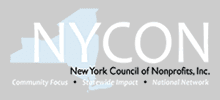In recognition of the important role, talents and leadership that a Certified Public Accountant (CPA) in New York State can provide as a board member for community-based charities, NYCON and NYSSCPA are pleased to announce the 7th Annual Michael H. Urbach, CPA, Community Builder's Award.
The award is named in honor of the late Michael H. Urbach, CPA, former partner of Urbach, Kahn and Werlin, former NYS Commissioner of Tax and Finance and Chair of the State Employees federated Appeal, and board leader of a number of charities.
Award Criteria & Submission
Candidates must:
- Be a CPA in good standing and a member of the New York State Society of Certified Public Accountants;
- Have served as an Officer on at least 3 different charitable 501(c)(3) community-based nonprofits with service as President/Chair at least once;
- Have demonstrated exemplary board leadership resulting in significant and positive organizational impact including, but not limited to, financial turn-around, growth, and/or organizational re-structuring; and
- Preference will be given to nominees whose board leadership accomplishments have been with community-based charities.
Deadline - August 30th, 2010
Nominations addressing the candidate's qualifications must be submitted in writing and received by August 30th, 2010. Nominators are strongly encouraged to include letters of support from the charities who have benefited from the candidate's volunteer leadership.
Send six (6) packets of nomination materials to:
Urbach Community Builder's Award Committee
New York Council of Nonprofits
272 Broadway
Albany NY 12204
Announcement & Presentation
The 2010 award will be formally presented at the Annual Member Meeting of NYCON slated for the afternoon of September 30th at Mohonk Mountain House, New Paltz, New York.
The Luncheon will take place during CAMP FINANCE, a two-day retreat that provides the very best in knowledge and skill development sessions for fiscal and management staff, as well as board members. New this year, it has expanded to include the popular "Money for Mission" tracks that will focus on fundraising, marketing, social media, grant making (both government and philanthropic) and more!
In honor of the late Harold Mandel, a certified public accountant who worked for Urbach, Kahn & Werlin in Albany, NY and retired in West Palm Beach, FL, the 2010 Urbach Honoree has the privilege to award three (3) nonprofit executives of their choice Camp Finance scholarships in Hal's name. In 2009, Mr. Mandel's family accepted a posthumous Michael H. Urbach, CPA Community Builder's Award in his tribute.












